Conflict Management in Healthcare: Nursing Perspectives
VerifiedAdded on 2020/12/18
|7
|1641
|437
Report
AI Summary
This report provides a comprehensive analysis of interprofessional conflict within the nursing and broader healthcare environment. It begins by defining conflicts and their impact, particularly interpersonal conflicts between nurses and physicians, and how these disagreements can affect patient care. The report then identifies several contributing factors to these conflicts, including differing job roles, competition among professionals, diversity in opinions, and the influence of the hospital environment. The core of the report focuses on conflict resolution strategies, such as compromise, avoidance, collaboration, and communication. It emphasizes the importance of identifying the source of conflicts and using appropriate dispute resolution methods to ensure healthcare efficiency and improve patient outcomes. Finally, it concludes by summarizing the key findings and the importance of conflict management in healthcare settings.
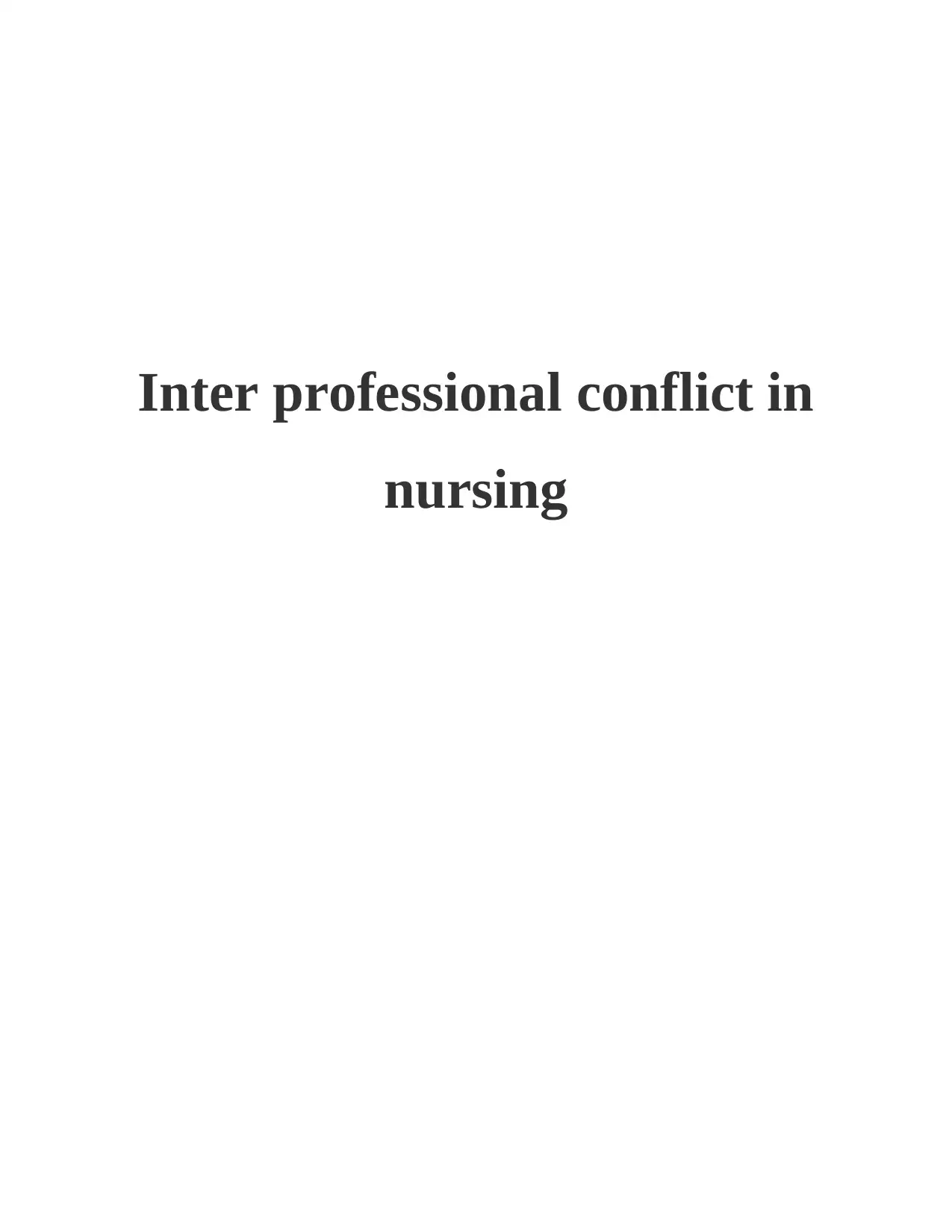
Inter professional conflict in
nursing
nursing
Paraphrase This Document
Need a fresh take? Get an instant paraphrase of this document with our AI Paraphraser
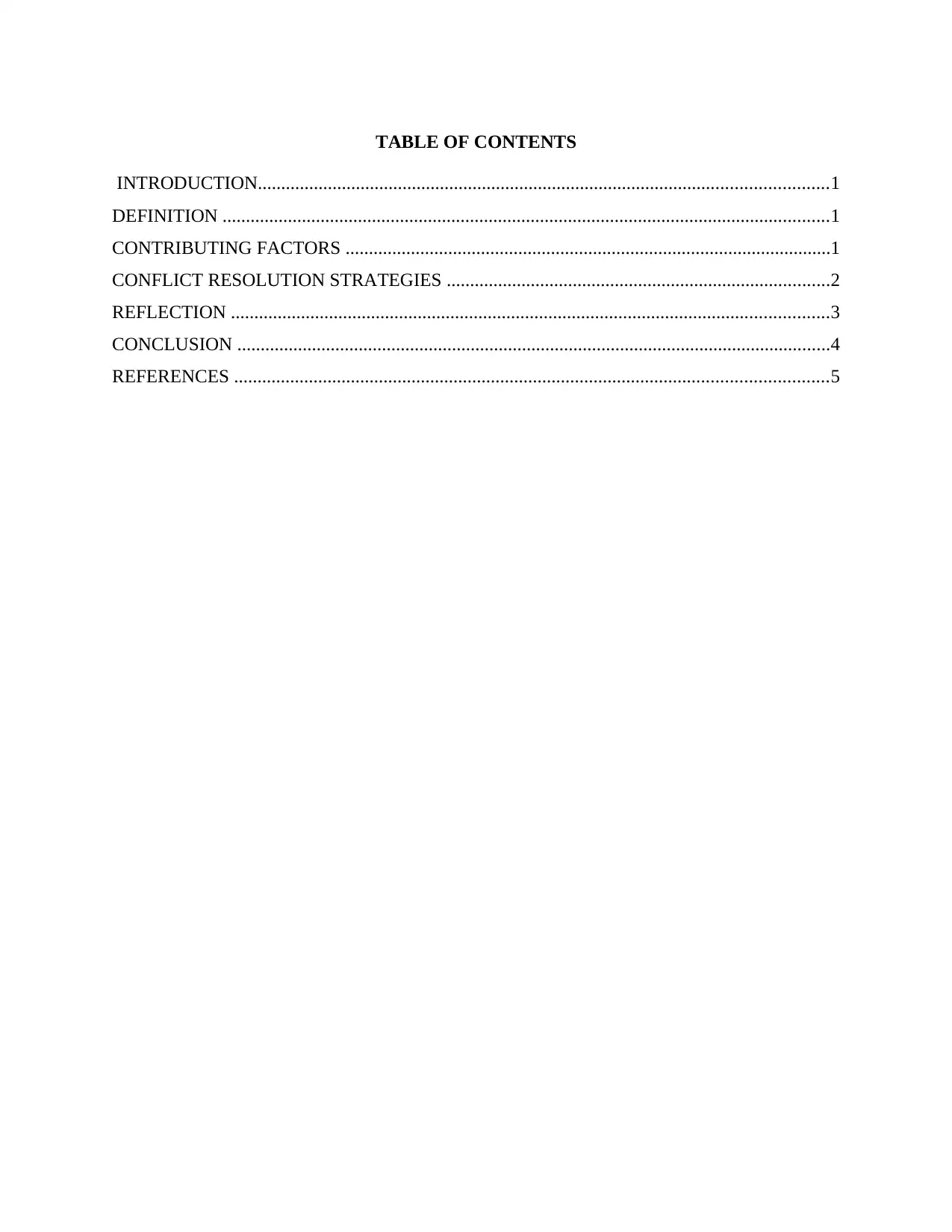
TABLE OF CONTENTS
INTRODUCTION..........................................................................................................................1
DEFINITION ..................................................................................................................................1
CONTRIBUTING FACTORS ........................................................................................................1
CONFLICT RESOLUTION STRATEGIES ..................................................................................2
REFLECTION ................................................................................................................................3
CONCLUSION ...............................................................................................................................4
REFERENCES ...............................................................................................................................5
INTRODUCTION..........................................................................................................................1
DEFINITION ..................................................................................................................................1
CONTRIBUTING FACTORS ........................................................................................................1
CONFLICT RESOLUTION STRATEGIES ..................................................................................2
REFLECTION ................................................................................................................................3
CONCLUSION ...............................................................................................................................4
REFERENCES ...............................................................................................................................5
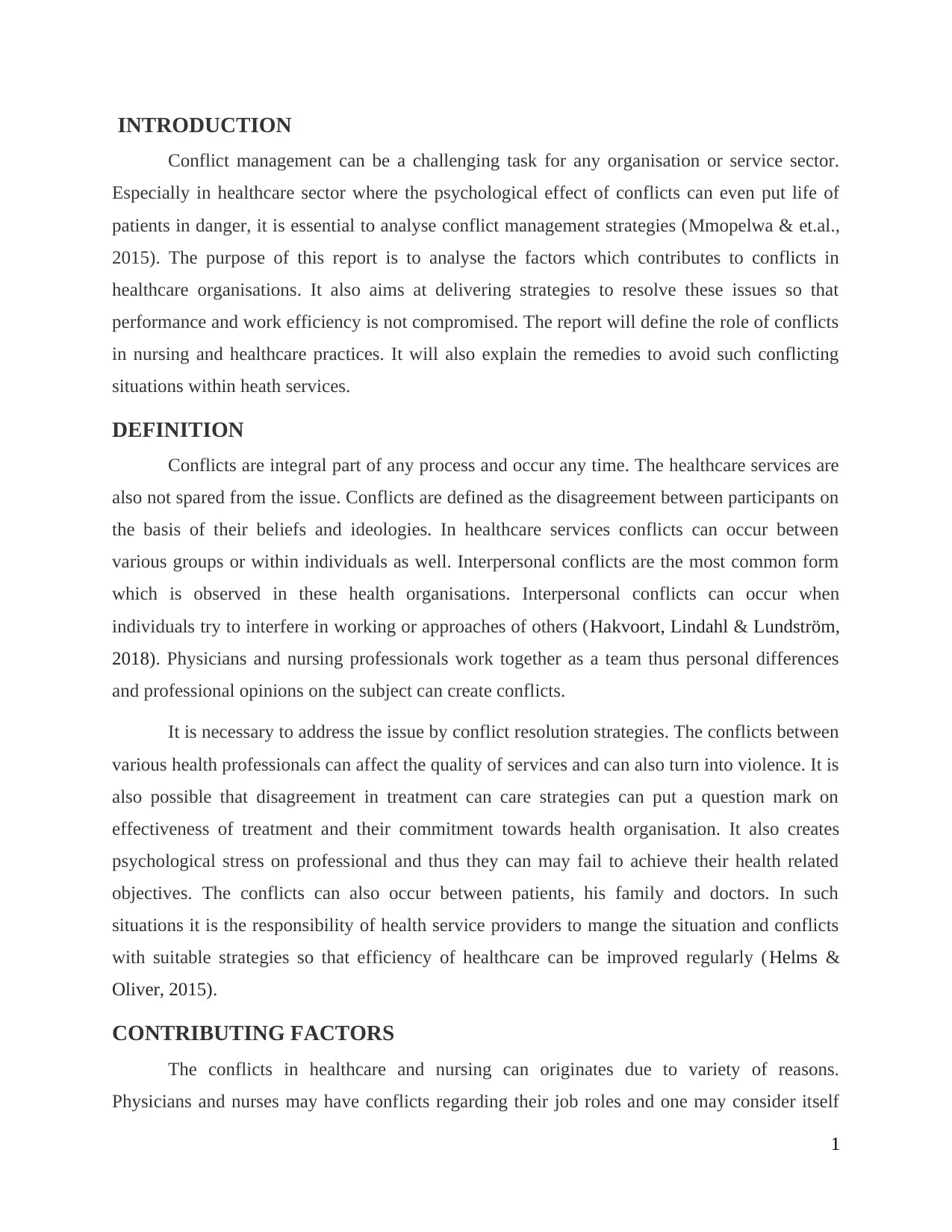
INTRODUCTION
Conflict management can be a challenging task for any organisation or service sector.
Especially in healthcare sector where the psychological effect of conflicts can even put life of
patients in danger, it is essential to analyse conflict management strategies (Mmopelwa & et.al.,
2015). The purpose of this report is to analyse the factors which contributes to conflicts in
healthcare organisations. It also aims at delivering strategies to resolve these issues so that
performance and work efficiency is not compromised. The report will define the role of conflicts
in nursing and healthcare practices. It will also explain the remedies to avoid such conflicting
situations within heath services.
DEFINITION
Conflicts are integral part of any process and occur any time. The healthcare services are
also not spared from the issue. Conflicts are defined as the disagreement between participants on
the basis of their beliefs and ideologies. In healthcare services conflicts can occur between
various groups or within individuals as well. Interpersonal conflicts are the most common form
which is observed in these health organisations. Interpersonal conflicts can occur when
individuals try to interfere in working or approaches of others (Hakvoort, Lindahl & Lundström,
2018). Physicians and nursing professionals work together as a team thus personal differences
and professional opinions on the subject can create conflicts.
It is necessary to address the issue by conflict resolution strategies. The conflicts between
various health professionals can affect the quality of services and can also turn into violence. It is
also possible that disagreement in treatment can care strategies can put a question mark on
effectiveness of treatment and their commitment towards health organisation. It also creates
psychological stress on professional and thus they can may fail to achieve their health related
objectives. The conflicts can also occur between patients, his family and doctors. In such
situations it is the responsibility of health service providers to mange the situation and conflicts
with suitable strategies so that efficiency of healthcare can be improved regularly (Helms &
Oliver, 2015).
CONTRIBUTING FACTORS
The conflicts in healthcare and nursing can originates due to variety of reasons.
Physicians and nurses may have conflicts regarding their job roles and one may consider itself
1
Conflict management can be a challenging task for any organisation or service sector.
Especially in healthcare sector where the psychological effect of conflicts can even put life of
patients in danger, it is essential to analyse conflict management strategies (Mmopelwa & et.al.,
2015). The purpose of this report is to analyse the factors which contributes to conflicts in
healthcare organisations. It also aims at delivering strategies to resolve these issues so that
performance and work efficiency is not compromised. The report will define the role of conflicts
in nursing and healthcare practices. It will also explain the remedies to avoid such conflicting
situations within heath services.
DEFINITION
Conflicts are integral part of any process and occur any time. The healthcare services are
also not spared from the issue. Conflicts are defined as the disagreement between participants on
the basis of their beliefs and ideologies. In healthcare services conflicts can occur between
various groups or within individuals as well. Interpersonal conflicts are the most common form
which is observed in these health organisations. Interpersonal conflicts can occur when
individuals try to interfere in working or approaches of others (Hakvoort, Lindahl & Lundström,
2018). Physicians and nursing professionals work together as a team thus personal differences
and professional opinions on the subject can create conflicts.
It is necessary to address the issue by conflict resolution strategies. The conflicts between
various health professionals can affect the quality of services and can also turn into violence. It is
also possible that disagreement in treatment can care strategies can put a question mark on
effectiveness of treatment and their commitment towards health organisation. It also creates
psychological stress on professional and thus they can may fail to achieve their health related
objectives. The conflicts can also occur between patients, his family and doctors. In such
situations it is the responsibility of health service providers to mange the situation and conflicts
with suitable strategies so that efficiency of healthcare can be improved regularly (Helms &
Oliver, 2015).
CONTRIBUTING FACTORS
The conflicts in healthcare and nursing can originates due to variety of reasons.
Physicians and nurses may have conflicts regarding their job roles and one may consider itself
1
⊘ This is a preview!⊘
Do you want full access?
Subscribe today to unlock all pages.

Trusted by 1+ million students worldwide
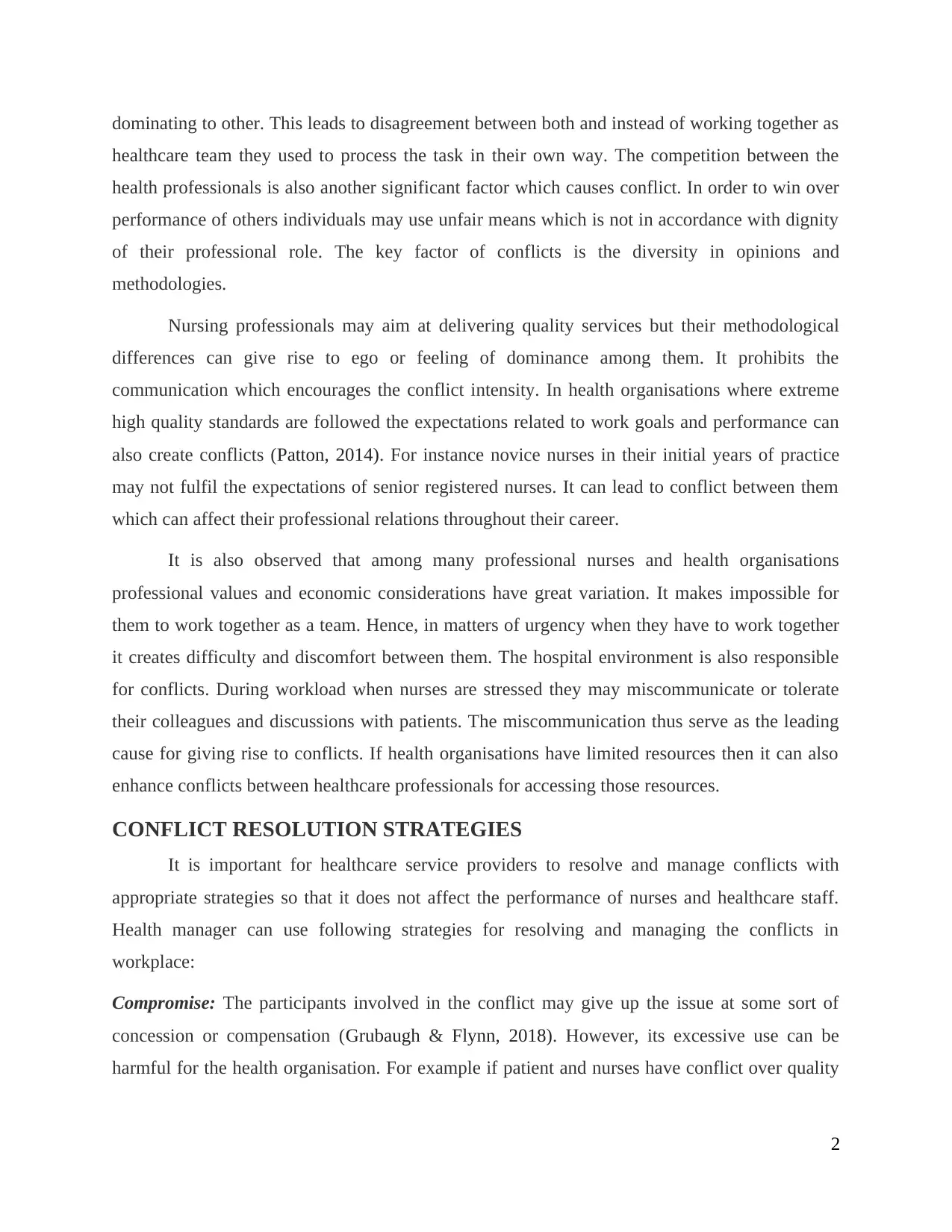
dominating to other. This leads to disagreement between both and instead of working together as
healthcare team they used to process the task in their own way. The competition between the
health professionals is also another significant factor which causes conflict. In order to win over
performance of others individuals may use unfair means which is not in accordance with dignity
of their professional role. The key factor of conflicts is the diversity in opinions and
methodologies.
Nursing professionals may aim at delivering quality services but their methodological
differences can give rise to ego or feeling of dominance among them. It prohibits the
communication which encourages the conflict intensity. In health organisations where extreme
high quality standards are followed the expectations related to work goals and performance can
also create conflicts (Patton, 2014). For instance novice nurses in their initial years of practice
may not fulfil the expectations of senior registered nurses. It can lead to conflict between them
which can affect their professional relations throughout their career.
It is also observed that among many professional nurses and health organisations
professional values and economic considerations have great variation. It makes impossible for
them to work together as a team. Hence, in matters of urgency when they have to work together
it creates difficulty and discomfort between them. The hospital environment is also responsible
for conflicts. During workload when nurses are stressed they may miscommunicate or tolerate
their colleagues and discussions with patients. The miscommunication thus serve as the leading
cause for giving rise to conflicts. If health organisations have limited resources then it can also
enhance conflicts between healthcare professionals for accessing those resources.
CONFLICT RESOLUTION STRATEGIES
It is important for healthcare service providers to resolve and manage conflicts with
appropriate strategies so that it does not affect the performance of nurses and healthcare staff.
Health manager can use following strategies for resolving and managing the conflicts in
workplace:
Compromise: The participants involved in the conflict may give up the issue at some sort of
concession or compensation (Grubaugh & Flynn, 2018). However, its excessive use can be
harmful for the health organisation. For example if patient and nurses have conflict over quality
2
healthcare team they used to process the task in their own way. The competition between the
health professionals is also another significant factor which causes conflict. In order to win over
performance of others individuals may use unfair means which is not in accordance with dignity
of their professional role. The key factor of conflicts is the diversity in opinions and
methodologies.
Nursing professionals may aim at delivering quality services but their methodological
differences can give rise to ego or feeling of dominance among them. It prohibits the
communication which encourages the conflict intensity. In health organisations where extreme
high quality standards are followed the expectations related to work goals and performance can
also create conflicts (Patton, 2014). For instance novice nurses in their initial years of practice
may not fulfil the expectations of senior registered nurses. It can lead to conflict between them
which can affect their professional relations throughout their career.
It is also observed that among many professional nurses and health organisations
professional values and economic considerations have great variation. It makes impossible for
them to work together as a team. Hence, in matters of urgency when they have to work together
it creates difficulty and discomfort between them. The hospital environment is also responsible
for conflicts. During workload when nurses are stressed they may miscommunicate or tolerate
their colleagues and discussions with patients. The miscommunication thus serve as the leading
cause for giving rise to conflicts. If health organisations have limited resources then it can also
enhance conflicts between healthcare professionals for accessing those resources.
CONFLICT RESOLUTION STRATEGIES
It is important for healthcare service providers to resolve and manage conflicts with
appropriate strategies so that it does not affect the performance of nurses and healthcare staff.
Health manager can use following strategies for resolving and managing the conflicts in
workplace:
Compromise: The participants involved in the conflict may give up the issue at some sort of
concession or compensation (Grubaugh & Flynn, 2018). However, its excessive use can be
harmful for the health organisation. For example if patient and nurses have conflict over quality
2
Paraphrase This Document
Need a fresh take? Get an instant paraphrase of this document with our AI Paraphraser
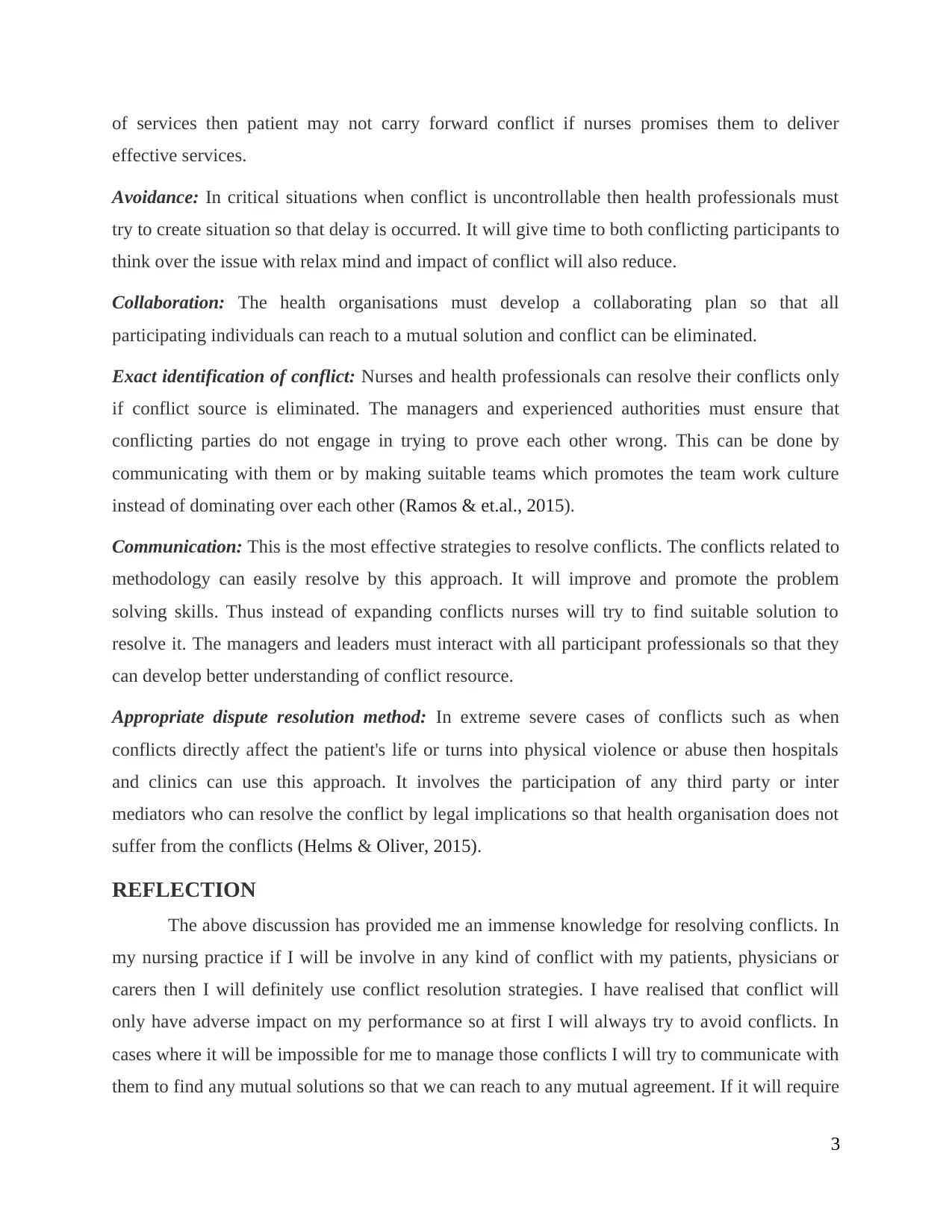
of services then patient may not carry forward conflict if nurses promises them to deliver
effective services.
Avoidance: In critical situations when conflict is uncontrollable then health professionals must
try to create situation so that delay is occurred. It will give time to both conflicting participants to
think over the issue with relax mind and impact of conflict will also reduce.
Collaboration: The health organisations must develop a collaborating plan so that all
participating individuals can reach to a mutual solution and conflict can be eliminated.
Exact identification of conflict: Nurses and health professionals can resolve their conflicts only
if conflict source is eliminated. The managers and experienced authorities must ensure that
conflicting parties do not engage in trying to prove each other wrong. This can be done by
communicating with them or by making suitable teams which promotes the team work culture
instead of dominating over each other (Ramos & et.al., 2015).
Communication: This is the most effective strategies to resolve conflicts. The conflicts related to
methodology can easily resolve by this approach. It will improve and promote the problem
solving skills. Thus instead of expanding conflicts nurses will try to find suitable solution to
resolve it. The managers and leaders must interact with all participant professionals so that they
can develop better understanding of conflict resource.
Appropriate dispute resolution method: In extreme severe cases of conflicts such as when
conflicts directly affect the patient's life or turns into physical violence or abuse then hospitals
and clinics can use this approach. It involves the participation of any third party or inter
mediators who can resolve the conflict by legal implications so that health organisation does not
suffer from the conflicts (Helms & Oliver, 2015).
REFLECTION
The above discussion has provided me an immense knowledge for resolving conflicts. In
my nursing practice if I will be involve in any kind of conflict with my patients, physicians or
carers then I will definitely use conflict resolution strategies. I have realised that conflict will
only have adverse impact on my performance so at first I will always try to avoid conflicts. In
cases where it will be impossible for me to manage those conflicts I will try to communicate with
them to find any mutual solutions so that we can reach to any mutual agreement. If it will require
3
effective services.
Avoidance: In critical situations when conflict is uncontrollable then health professionals must
try to create situation so that delay is occurred. It will give time to both conflicting participants to
think over the issue with relax mind and impact of conflict will also reduce.
Collaboration: The health organisations must develop a collaborating plan so that all
participating individuals can reach to a mutual solution and conflict can be eliminated.
Exact identification of conflict: Nurses and health professionals can resolve their conflicts only
if conflict source is eliminated. The managers and experienced authorities must ensure that
conflicting parties do not engage in trying to prove each other wrong. This can be done by
communicating with them or by making suitable teams which promotes the team work culture
instead of dominating over each other (Ramos & et.al., 2015).
Communication: This is the most effective strategies to resolve conflicts. The conflicts related to
methodology can easily resolve by this approach. It will improve and promote the problem
solving skills. Thus instead of expanding conflicts nurses will try to find suitable solution to
resolve it. The managers and leaders must interact with all participant professionals so that they
can develop better understanding of conflict resource.
Appropriate dispute resolution method: In extreme severe cases of conflicts such as when
conflicts directly affect the patient's life or turns into physical violence or abuse then hospitals
and clinics can use this approach. It involves the participation of any third party or inter
mediators who can resolve the conflict by legal implications so that health organisation does not
suffer from the conflicts (Helms & Oliver, 2015).
REFLECTION
The above discussion has provided me an immense knowledge for resolving conflicts. In
my nursing practice if I will be involve in any kind of conflict with my patients, physicians or
carers then I will definitely use conflict resolution strategies. I have realised that conflict will
only have adverse impact on my performance so at first I will always try to avoid conflicts. In
cases where it will be impossible for me to manage those conflicts I will try to communicate with
them to find any mutual solutions so that we can reach to any mutual agreement. If it will require
3
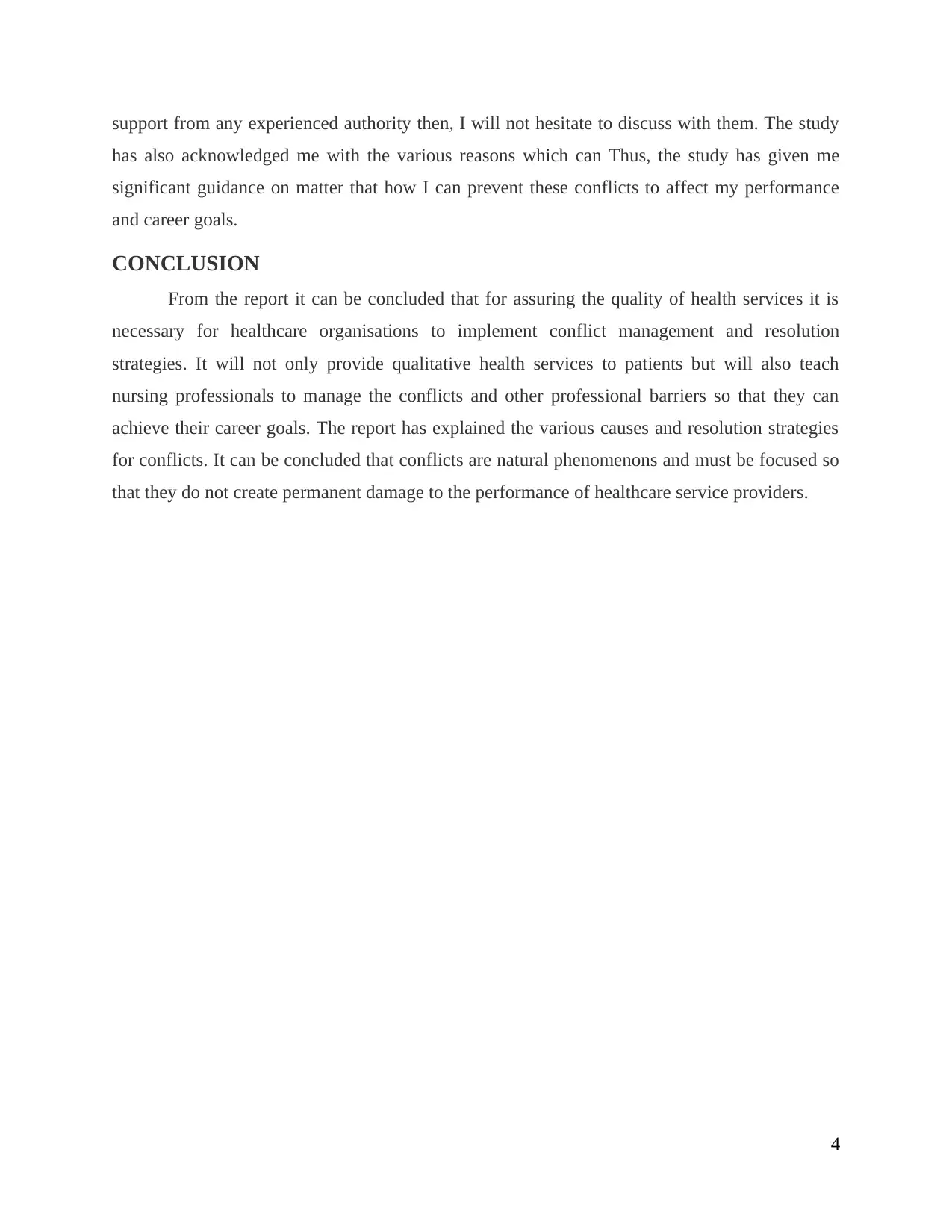
support from any experienced authority then, I will not hesitate to discuss with them. The study
has also acknowledged me with the various reasons which can Thus, the study has given me
significant guidance on matter that how I can prevent these conflicts to affect my performance
and career goals.
CONCLUSION
From the report it can be concluded that for assuring the quality of health services it is
necessary for healthcare organisations to implement conflict management and resolution
strategies. It will not only provide qualitative health services to patients but will also teach
nursing professionals to manage the conflicts and other professional barriers so that they can
achieve their career goals. The report has explained the various causes and resolution strategies
for conflicts. It can be concluded that conflicts are natural phenomenons and must be focused so
that they do not create permanent damage to the performance of healthcare service providers.
4
has also acknowledged me with the various reasons which can Thus, the study has given me
significant guidance on matter that how I can prevent these conflicts to affect my performance
and career goals.
CONCLUSION
From the report it can be concluded that for assuring the quality of health services it is
necessary for healthcare organisations to implement conflict management and resolution
strategies. It will not only provide qualitative health services to patients but will also teach
nursing professionals to manage the conflicts and other professional barriers so that they can
achieve their career goals. The report has explained the various causes and resolution strategies
for conflicts. It can be concluded that conflicts are natural phenomenons and must be focused so
that they do not create permanent damage to the performance of healthcare service providers.
4
⊘ This is a preview!⊘
Do you want full access?
Subscribe today to unlock all pages.

Trusted by 1+ million students worldwide
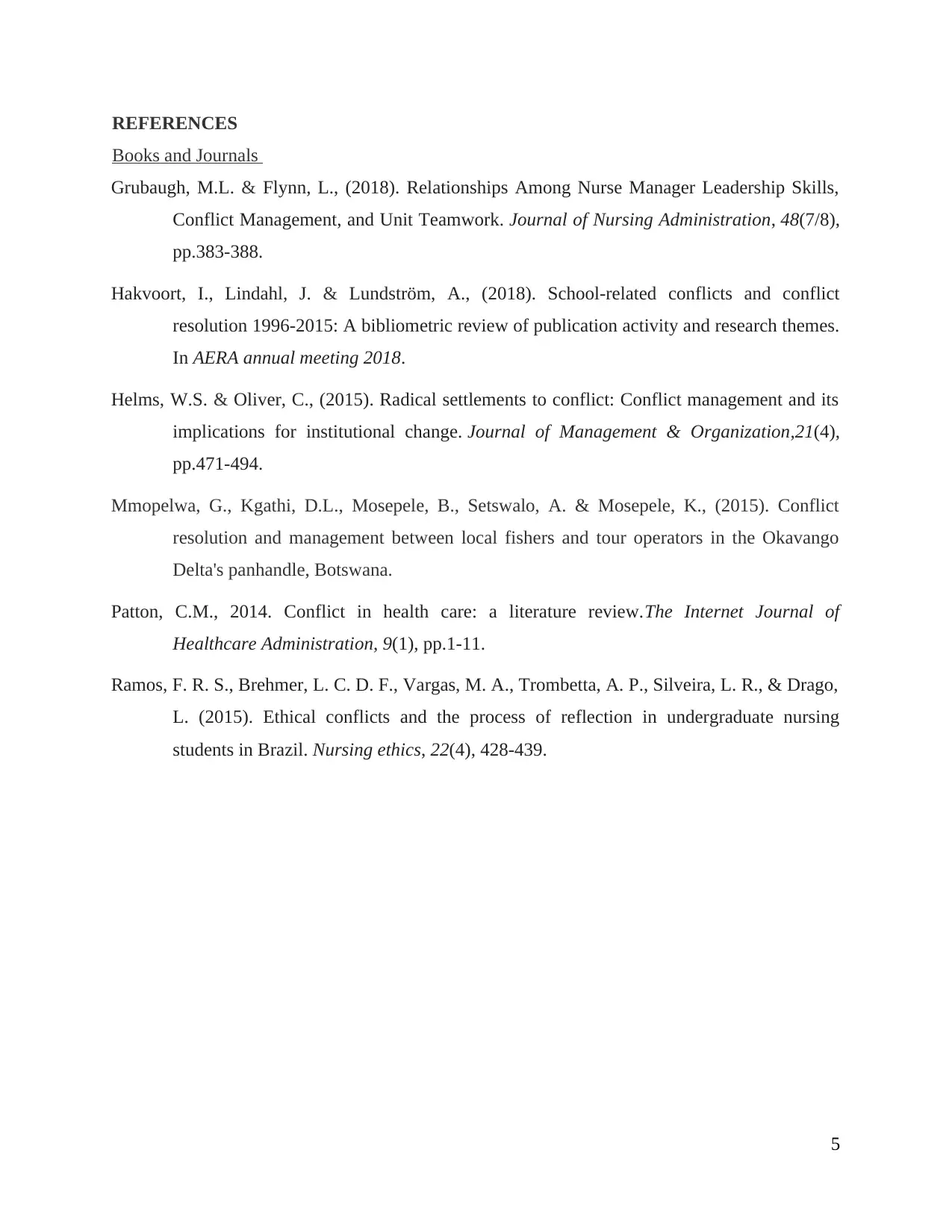
REFERENCES
Books and Journals
Grubaugh, M.L. & Flynn, L., (2018). Relationships Among Nurse Manager Leadership Skills,
Conflict Management, and Unit Teamwork. Journal of Nursing Administration, 48(7/8),
pp.383-388.
Hakvoort, I., Lindahl, J. & Lundström, A., (2018). School-related conflicts and conflict
resolution 1996-2015: A bibliometric review of publication activity and research themes.
In AERA annual meeting 2018.
Helms, W.S. & Oliver, C., (2015). Radical settlements to conflict: Conflict management and its
implications for institutional change. Journal of Management & Organization,21(4),
pp.471-494.
Mmopelwa, G., Kgathi, D.L., Mosepele, B., Setswalo, A. & Mosepele, K., (2015). Conflict
resolution and management between local fishers and tour operators in the Okavango
Delta's panhandle, Botswana.
Patton, C.M., 2014. Conflict in health care: a literature review.The Internet Journal of
Healthcare Administration, 9(1), pp.1-11.
Ramos, F. R. S., Brehmer, L. C. D. F., Vargas, M. A., Trombetta, A. P., Silveira, L. R., & Drago,
L. (2015). Ethical conflicts and the process of reflection in undergraduate nursing
students in Brazil. Nursing ethics, 22(4), 428-439.
5
Books and Journals
Grubaugh, M.L. & Flynn, L., (2018). Relationships Among Nurse Manager Leadership Skills,
Conflict Management, and Unit Teamwork. Journal of Nursing Administration, 48(7/8),
pp.383-388.
Hakvoort, I., Lindahl, J. & Lundström, A., (2018). School-related conflicts and conflict
resolution 1996-2015: A bibliometric review of publication activity and research themes.
In AERA annual meeting 2018.
Helms, W.S. & Oliver, C., (2015). Radical settlements to conflict: Conflict management and its
implications for institutional change. Journal of Management & Organization,21(4),
pp.471-494.
Mmopelwa, G., Kgathi, D.L., Mosepele, B., Setswalo, A. & Mosepele, K., (2015). Conflict
resolution and management between local fishers and tour operators in the Okavango
Delta's panhandle, Botswana.
Patton, C.M., 2014. Conflict in health care: a literature review.The Internet Journal of
Healthcare Administration, 9(1), pp.1-11.
Ramos, F. R. S., Brehmer, L. C. D. F., Vargas, M. A., Trombetta, A. P., Silveira, L. R., & Drago,
L. (2015). Ethical conflicts and the process of reflection in undergraduate nursing
students in Brazil. Nursing ethics, 22(4), 428-439.
5
1 out of 7
Related Documents
Your All-in-One AI-Powered Toolkit for Academic Success.
+13062052269
info@desklib.com
Available 24*7 on WhatsApp / Email
![[object Object]](/_next/static/media/star-bottom.7253800d.svg)
Unlock your academic potential
Copyright © 2020–2026 A2Z Services. All Rights Reserved. Developed and managed by ZUCOL.




